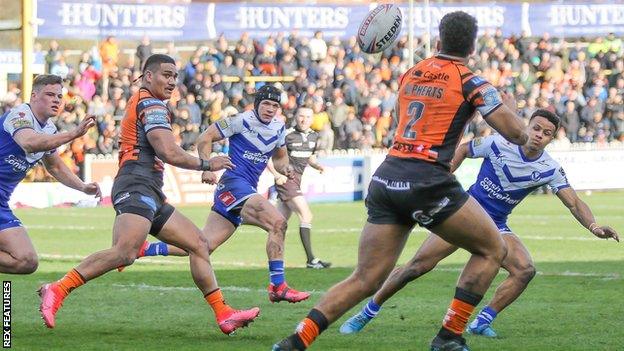Rugby league: Players want greater say on salary cap changes
- Published

Castleford against St Helens was the last Super League game to be played on 15 March
Rugby league players have called for a greater say in any decision by Super League clubs regarding a reduction of the the salary cap regulations.
Super League runs with a cap of £2.1m per team, which covers all payments but for eight "key dispensations"., external
The league's 12 clubs have been in discussions regarding a reduction of the cap to its 2017 figure of £1.8m.
In addition, the Rugby Football League also holds a 13th vote on behalf of the whole game.
"We all want a return to rugby league ASAP," former Great Britain international and GMB union rep Garreth Carvell said.
"Whilst we know there are huge obstacles to overcome, its vital that players can have their say on how we get there.
"We also know that fans and our communities support our call to the RFL and the clubs to give us our voice and say in how the rugby revival takes shape. "With the imminent review of the salary cap, it's the player's wages that will be cut, and yet they don't get say.
"Players believe now, more than any time before, our input is vital. It can't be right that the people playing the game are the only ones that don't get a say."
Many players have posted blue squares on social media to call for a united front and ensure players and other stakeholders can "work together for a greater game".
The government has provided a £16m loan to the Rugby Football League, for professional clubs to apply to draw on in order to meet the financial commitments during lockdown.
In addition, players and staff have been furloughed under the Job Retention Scheme.
Rugby league's players union in the United Kingdom is an umbrella of the General, Municipal, Boilermakers Union, better known as the GMB Union.
In Australia, the Rugby League Players' Association has a greater role at present in dictating its position to the National Rugby League, as has been clear during negotiations behind a return to play and players taking salary cuts before Thursday's restart.
They were also influential in terms of the need for biosecurity and player welfare, and players within the northern hemisphere would like a similar ability to contribute to the discussion.
"We've asked for a vote on this and didn't get one, that won't stop us from expressing our opinion on this matter though," an anonymous Super League player said.
"We must be listened to. If we are going to return this sport to where it needs to be, the best and highest standard of rugby league possible, we think cutting the salary cap is a massive step in the wrong direction."